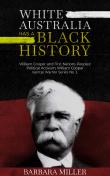
LitPick Review
Barbara Miller details the life of William Cooper (1860-1941), an activist for the rights of Australia's First Nations People, also known as the Aborigines.
Miller begins by describing Cooper's birth to an Aboriginal mother and Caucasian father, as well as his family life and Christian beliefs. She also recounts his activism, such as drafting the manifesto for full Citizenship Rights for the Aborigine people. He also led a protest that changed Australia Day, the day that celebrated Australia's founding, to a Day of Mourning because it was the day in which the white Australians "subdued the land" and destroyed the First Nations People.
The book continues after Cooper's death to describe the various events that helped or harmed the Aboriginal people. Some policies ended in disaster, such as the eugenics philosophy that resulted in the "Stolen Generation," a government plan which involved removing Aboriginal children from their parents to be educated and trained as cheap labor.
Others were more triumphant such as the 1962 law that gave Aborigines the right to vote and the passing of a referendum in 1967, which allowed Indigenous people to be counted in the census and also allowed them to report incidents of discrimination. In 1972, the Australian government returned some of the land to the Aborigines. In 2008, then-Prime Minister Kevin Rudd made an official apology to the Stolen Generation.
Opinion:
Miller writes a wonderful biography of Cooper and his involvement in helping the Aboriginal community at large. He suffered from many of the policies throughout his young life, but his late-in-life activism shows him to have been a man who felt the anger of his people but had the patience to speak eloquently of their concerns and the self-control to see those goals accomplished.
Miller also writes a great deal of Cooper's Christian faith and how it propelled Cooper's activism. He wanted the First Nations People to be treated well according to the Christian beliefs that many in the Australian government claimed to represent but failed to practice. He also learned to practice civil disobedience and pacifism, preferring to speak and organize protests rather than fight.
The middle section expertly reveals how people were inspired after Cooper's death to fight for Aborigines' rights and how the racist policies had long-term effects on the Australian population. Even now, some members of the Stolen Generation have trouble locating family members. It also shows what kindness can happen when people realize that the terrors of the past were wrong and should not be repeated. This is especially felt during the laws that aided the Indigenous people and Rudd's heartfelt and moving apology.
Above all, this book reveals Miller's personal connection to Cooper. Her husband is Aboriginal, and both he and his wife were involved in protests in obtaining rights to the First Nations People. In one chapter, Miller recalls a protest that resulted in her arrest. In the final chapters, Miller and her husband visited many places where Cooper grew up, lived, worked, and died. These chapters reveal how Cooper's involvement affected the subsequent generations, making his story a personal one for his family.
The pictures reveal a beautiful land where residents are making great strides changing for the future, but they still need a lot of work in preserving the environment and protecting all of its people.

